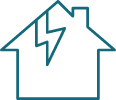Trusted By Thousands Of Homeowners For Over 20 Years.
How Our Process Works For You
Contact Us
Schedule your FREE In Person or Phone Consultation. We will be in contact within 24 hours.
Free Consultation
We will go over your situation, hear your wants and needs, to know what is best for you.
Problem Solved
Whatever option you decide we will be here to help you. In most cases, we are able to help you sell your home FAST.
Are You Currently Facing Any of These Situations?
Foreclosure
The bank is not forgiving. Maybe you don't have the income to pay your mortgage or maybe the bank increased your payments and the payment is no longer affordable each month.
Divorce
This is another common eventuality that may force you to sell your house. Couples are expected to split property by half if there are no prenuptial agreements.
Debt
You may also be in debt i.e. you owe a company or someone money yet you are unable to meet your repayment obligations.
Relocation
Whether you decide to move or you are forced to relocate because of work reasons or military deployment, you need to do something with the house your leave behind.
Death in family
The loss of a loved one is never easy. If they left behind a property sometimes it can be difficult to take on the burden of paying for the maintenance of the house.
Job loss
Also, you may have lost your job thus you are no longer in a capacity to meet your mortgage payments.
Why Work With Florida Homeowner Solutions?
Keep Your Home or Sell It On Your Terms
We will do all we can to help you keep your home. If you can't we will present you with the best options to sell it on your terms.
You Pay NO Commissions Or Fees
FHS wants to make sure you get as much of your equity as possible. Even if there is no equity left in your home, we will still make sure you have RELOCATION money!
Work With The Best
The people at FHS have been helping homeowners for over 20 years. The Founder, Ryan Kuhlman, has been awarded by the Mayors of Broward And Miami Dade Counties for helping homeowners out of foreclosure.

Make No Repairs To Your Home
We will purchase your property AS IS so you don't have to fix anything before we purchase.

What Our Clients Say
"Things got tough for us over the years, to where we ran into foreclosure. We had no other options to either sell or go into foreclosure. Then we met Florida Home Solutions. They helped us out very much. We will never forget what they did for us!"
